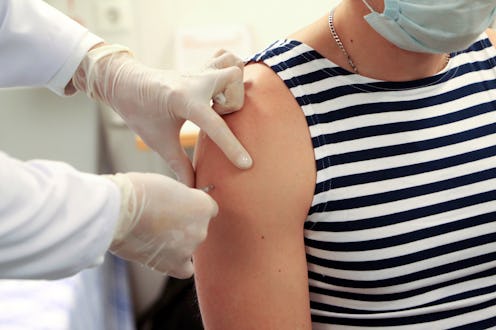Health
Experts Explain Why A Vaccine Won't Automatically End The Pandemic
You’ll still be masking and social distancing well into 2021.

The news that two different COVID vaccines are likely to be authorized by the end of the year triggered a collective sigh of relief heard around the country. Suddenly, your 2021 plans just got a lot more chill: You get your vaccine sometime in the spring or early summer, deal with some minor side effects, then you get to hug everyone in sight and go to concerts seven nights in a row. Right? Not quite. The COVID-19 vaccines aren't a silver bullet for the pandemic, experts tell Bustle; they can give a rough guide to when the COVID-19 pandemic might end, but they won't stop it in its tracks.
"It's truly beyond my wildest dreams that we could have not one but two vaccines that look to be safe and 94-95% effective," Dr. Leana Wen M.D., emergency physician and visiting professor at George Washington University Milken Institute School of Public Health, tells Bustle. "If the data continue to be promising, the vaccines will make a huge difference, and we could possibly eradicate coronavirus in time." But, like She-Ra, vaccines can't do all the work on their own.
When Will The Coronavirus Pandemic Be Over?
For coronavirus to disappear, Dr. Wen says, the community needs to reach herd immunity, a.k.a. the point where enough people have been vaccinated that the virus can't be passed between them. (Think about it this way: If everybody in your building aside from Agnes on the third floor is vaccinated, the chances of Agnes getting it are pretty slim.) That, realistically, will be the end of the road for COVID-19. "An estimated 70% of the population will need to be vaccinated," she says. "This is a major challenge given that two doses are required and we have to distribute hundreds of millions of doses in the U.S. alone."
But it's not as easy as just vaccinating 70% of the population, though. The thing about the COVID vaccines is that they'll still leave around 5% of people who get them vulnerable, because they're not 100% effective. "Even if we anticipate an aggressive target of 80% of Americans receiving the vaccine in the coming months, this would roughly still leave up to one in four Americans vulnerable to COVID," Dr. Kathleen Jordan M.D., SVP of Medical Affairs at medical provider Tia, tells Bustle. Here's the math: if 80% of eligible people get vaccinated, about 72-76% will actually be covered, based on the best possible performance of the vaccine. That will hopefully be enough to reach herd immunity, but again, it would take some time for us to get to that point.
The Challenges To Ending The Pandemic
Operation Warp Speed, the government body responsible for distributing the vaccine, is in charge of shipping vaccines to each state based on population, per NPR. But Dr. Teresa Bartlett M.D., senior medical officer for claims management service Sedgwick, explains that Warp Speed won't be going door-to-door with the vaccines, like some kind of medical Santa Claus. "Each state government is deciding, based on the federal recommendations, how to prioritize vaccines within their state," she says. So vaccination may take longer depending on whether you live in, say, California or Wyoming.
"There is also skepticism of science to overcome," Dr. Wen says. Only 58% of Americans said they'd be willing to get a COVID-19 vaccine, according to an October Gallup poll — and that was an increase from 50% in September. Widespread myths and misinformation about vaccine production and safety have made people distrustful of COVID-19 jabs, and that could prove to be a real obstacle to immunizing the population.
The COVID-19 vaccine will also likely be similar to the flu vaccine, in that you'll need new ones regularly. "We don't know how long immunity lasts, and booster shots may be necessary," Dr. Wen says. The downside of the blazing fast development of the vaccine is that Pfizer, Moderna and other pharmaceutical companies don't yet know for sure how long their products will remain effective. The head of BioNTech, the company that partnered with Pfizer to develop its vaccine, said in November he hoped that their vaccine would last for a year, but there's no way to tell without more data.
Asymptomatic spread is also a concern. The vaccines currently being evaluated by the FDA only tested people who showed COVID-19 symptoms. That means scientists don't know if the vaccines stop asymptomatic cases — where people show no symptoms — as well. And that's a problem, because a lot of COVID cases have zero, zip, nada signs of illness — between 15% and 80%, according to studies. Business Insider reports that scientists are crafting further studies that could show whether the vaccines stop the virus from spreading entirely by testing people every day, whether they show symptoms or not.
What To Do Until The Pandemic Is Really, Truly Over
Even if you're first in line for the COVID vaccine, experts advise not changing your behavior until researchers know more about its long-term impacts. Dr. Jordan advises staying home when you have any signs of illness, continuing to wash your hands rigorously, and wearing a mask when you have any symptoms. She predicts that while mask-wearing everywhere might become less necessary as more and more people are vaccinated, hygiene measures won't. "Cover your cough, mask up, wash your hands, and clean common areas frequently," she says.
"The availability of a vaccine alone is not a silver bullet," says Dr. Wen, "though it could mean that an end in sight."
Studies cited:
He, J., Guo, Y., Mao, R., & Zhang, J. (2020). Proportion of asymptomatic coronavirus disease 2019: A systematic review and meta-analysis. Journal of medical virology, 10.1002/jmv.26326. Advance online publication. https://doi.org/10.1002/jmv.26326
Experts:
Dr. Teresa Bartlett M.D.
Dr. Kathleen Jordan M.D.
Dr. Leana Wen M.D.